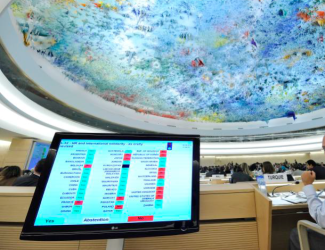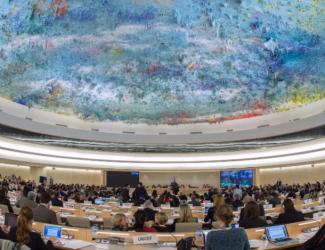The Human Rights Council (HRC) is the foremost intergovernmental body responsible for the promotion and protection of all human rights around the globe.

The voting of resolutions during the 15th Session of the Human Rights Council.
The Human Rights Council (HRC) is the foremost intergovernmental body responsible for the promotion and protection of all human rights around the globe.
The 46th session of the UN Human Rights Council started on 22 February and ended on 23 March 2021.
The HRC was presented with thematic and country reports from UN experts and where Member States debate and pass resolutions on cross-cutting human rights issues and human rights situations in particular countries.
Find below information on key reports and resolutions* that pertain to gender justice, sexuality and women's rights, as well as statements made by feminists activists and civil society on restrictions to civil society participation in this session
Key Reports at the 46th Session
- ‘Impact of the coronavirus disease (COVID 19) pandemic on the enjoyment of human rights around the world, including good practices and areas of concern’ - Report of the Office of the United Nations High Commissioner for Human Rights’
- ‘Rights of persons with disabilities’ - Report of the Special Rapporteur on the rights of persons with disabilities
- ‘Combating anti-Muslim hatred’ - Report of the Special Rapporteur on freedom of religion or belief (Advance unedited version)
- ‘Covid-19, culture and culture rights’ - Report of the Special Rapporteur in the field of cultural rights (Advance unedited version)
- ‘Final warning: death threats and killings of human rights defenders’ - Report of the Special Rapporteur on the situation of human rights defenders
- ‘Twenty years on the right to adequate housing: taking stock - moving ahead’ - Report of the Special Rapporteur on adequate housing as a component of the right to an adequate standard of living, and on the right to non-discrimination in this context (To be shared)
- ‘Panel discussion on promoting and protecting the rights of persons with disabilities in the context of climate change’ - Report of the United Nations High Commissioner for Human Rights
- ‘Relationship between the realization of the right to work and the enjoyment of all human rights by persons with disabilities.’ - Report of the United Nations High Commissioner for Human Rights
- ‘Combating intolerance, negative stereotyping and stigmatization of, and discrimination, incitement to violence and violence against persons based on religion or belief’ - Report of the United Nations High Commissioner for Human Rights
Key statements
- Civil society joint statement endorsed by 71 organizations denouncing vaccine nationalism, the stockpiling of COVID-19 vaccines and the stonewalling of a temporary TRIPS waiver proposal by rich countries.
- Civil society joint statement demanding accountability for the erosion of civil society space at the Human Rights Council
Key resolutions (To be updated)
- Preventable maternal mortality and morbidity (Burkina Faso, Colombia, Estonia and New Zealand)(postponed)
- Freedom of religion or belief (to be updated)
- Guaranteeing the right to health through equitable access to vaccines in response to pandemics and other health emergencies (Led by Ecuador and Azerbaijan on behalf of the Non-Aligned Movement) (as orally revised)
- Question of the realization in all countries of economic, social and cultural rights (Portugal)
- Torture and other cruel, inhuman or degrading treatment or punishment: role and responsibility of police and law enforcement officials in preventing and combating torture (Denmark)
- The negative impact of unilateral coercive measures on the enjoyment of human rights (Azerbaijan on behalf of the Non-Aligned Movement)
- The right to food (Cuba)
- The effects of foreign debt and other related international financial obligations of States on the full enjoyment of all human rights, particularly economic, social and cultural rights (Cuba)
- Several mandate renewal resolutions including for the the Special Rapporteur on cultural rights (A/HRC/46/L.12, led by Cuba), Special Rapporteur on the right to privacy (A/HRC/46/L.28, led by Austria, Brazil, Germany, Liechtenstein, Mexico) and the Special Rapporteur on human rights and the environment (A/HRC/46/L.6/Rev.1, led by Costa Rica, Maldives, Morocco, Slovenia, Switzerland)
